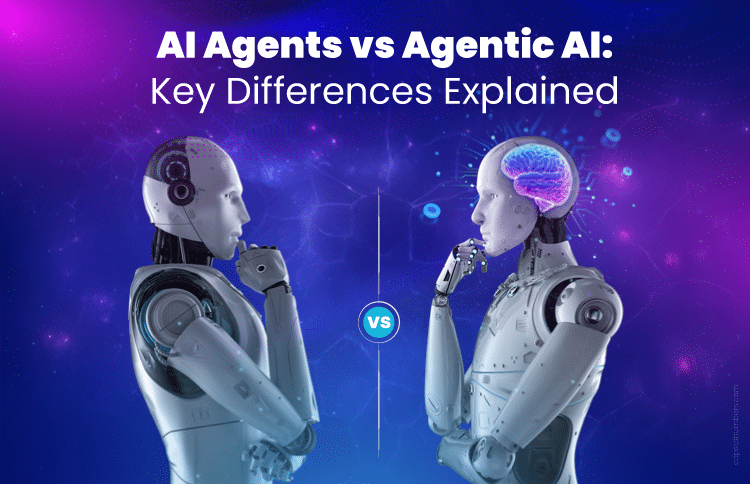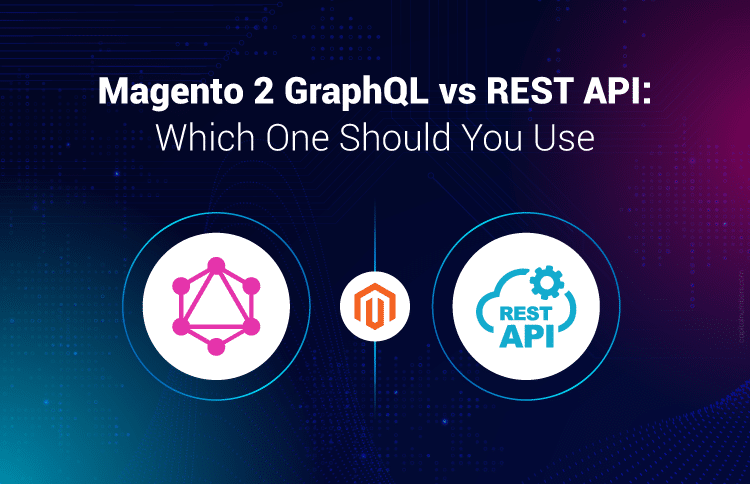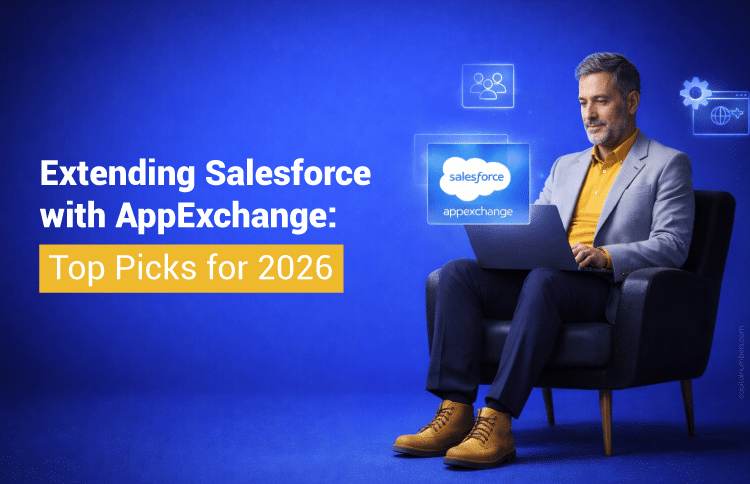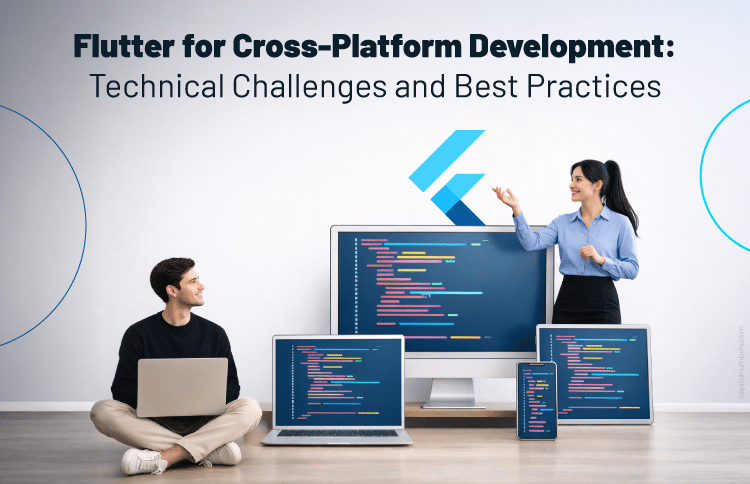AI Agents vs Agentic AI: Key Differences Explained
Table of Contents
Artificial Intelligence (AI) has come a long way, transforming how businesses operate and interact with customers. Among the many AI technologies evolving today, AI Agents and Agentic AI stand out as two important concepts shaping the future of automation and intelligent systems.
While both are part of the broader field of intelligent automation, they differ significantly in their capabilities. AI Agents are typically rule-based, following pre-set instructions to complete specific tasks. In contrast, Agentic AI offers more autonomy, with the ability to make independent decisions, learn from experiences, and adapt in real-time. These differences in autonomy, decision-making flexibility, and adaptability are key in defining their roles in automation and business processes. As AI technology continues to evolve, understanding these distinctions will help businesses determine which AI solution aligns best with their needs.
So, what exactly sets AI Agents and Agentic AI apart? What are their key differences? Let’s explore these questions to help you understand their strengths and uses.
What Are AI Agents?
An AI Agent is a software program designed to perform specific tasks by following set rules or algorithms. It responds to inputs from its environment in a focused and controlled manner to achieve its goals. Unlike human intelligence, which is flexible and adaptive, AI Agents operate automatically based on set rules and data.
Core Components and Architecture
AI Agents have three main parts:
- Sensors: To collect information from their environment
- Processor: To think and decide what to do based on the information
- Actuators: To carry out the actions agreed upon by the processor
This setup helps AI Agents interact with the world smartly and in an organized way.
Types of AI Agents
There are different kinds of AI Agents depending on how they work:
- Reactive Agents: Respond quickly to what’s happening now, without remembering the past.
- Deliberative Agents: Think ahead and plan by keeping a model of the world.
- Hybrid Agents: Use quick reactions and thoughtful planning.
- Learning Agents: Learn from experience and get better over time.
Looking to grow your business with smart digital solutions?
Choose Capital Numbers for AI software development and get custom, scalable solutions that drive growth and set your business up for long-term success.
What Is Agentic AI?
Agentic AI is an advanced form of intelligent automation that goes beyond traditional AI Agents by acting with greater autonomy and purpose. While regular AI Agents follow set rules to perform tasks, Agentic AI can set its own goals and make decisions independently to achieve them.
Core Components of Agentic AI
- Autonomy: Operates with minimal human guidance
- Goal-Directed Behavior: Defines and pursues its objectives
- Self-Learning: Continuously improves from new data and experiences
- Adaptive Decision-Making: Changes actions based on real-time information
- Environment Interaction: Understands and reacts to complex, dynamic surroundings
How Agentic AI Works?
- Analyzes data and environment in real time
- Sets and prioritizes its goals
- Plans and executes actions independently
- Learns and adapts continuously from experience
- Adjusts decisions dynamically based on changing conditions
What is the Difference Between AI Agents and Agentic AI?
An AI agent is like a program or system that does a specific job, like making decisions or performing tasks based on the data it receives. It follows rules or instructions to get things done, but it doesn’t really think or adapt on its own.
Agentic AI is a step ahead. It refers to AI systems that can make their own decisions and adapt to new situations, almost like they have goals or objectives to achieve. This type of AI can learn from its experiences and make choices to reach those goals, without needing to follow strict instructions all the time.
So, the main difference is that AI agents follow specific rules to do a job, while Agentic AI can think, adapt, and make decisions more like humans do.
In the following, we’ll break down the key differences between AI agents and Agentic AI in more detail.
1. Autonomy:
AI Agents follow clear, pre-set rules and need detailed instructions to operate. Agentic AI is more independent – it can decide on its goals and plan how to achieve them without constant human help.
2. Decision-Making:
AI Agents make decisions based on fixed rules or programmed responses. Agentic AI can assess situations, think ahead, and make flexible decisions based on what’s happening in real time.
3. Learning:
AI Agents usually learn only from specific training data or examples. Agentic AI continuously learns from new experiences and information, improving its abilities without retraining.
4. Flexibility:
AI Agents are designed for narrow, specific tasks and may struggle outside those limits. Agentic AI is much more flexible, able to handle various tasks and adjust to changing circumstances.
5. Environment Interaction:
AI Agents respond mainly to known and expected inputs. Agentic AI can understand complex environments, detect changes, and adapt behavior accordingly.
6. Task Complexity:
AI Agents work well with simple or moderately complex tasks. Agentic AI can manage complex, multi-step problems that require planning, reasoning, and adjustment.
7. Human Supervision:
AI Agents often require human monitoring to ensure correct operation and handle exceptions. However, agentic AI can operate mostly independently, needing little to no human oversight.
8. Business Use:
AI Agents are commonly used to automate routine, repetitive business processes. Agentic AI supports advanced intelligent automation, helping companies innovate and make smarter, faster decisions.
9. Adaptability:
AI Agents typically follow fixed patterns and responses. Agentic AI can change its strategies dynamically based on new data, goals, or unexpected changes.
10. Development:
AI development companies usually build AI Agents for specific, well-defined functions. Creating Agentic AI involves building more advanced systems capable of working independently in diverse and unpredictable situations.
You May Also Read: Artificial Intelligence vs. Human Intelligence: Key Differences
AI Agent vs Agentic AI: At a Glance
| Feature | AI Agent | Agentic AI |
|---|---|---|
| Autonomous Goal Setting | ||
| Rule-Based Decision Making | ||
| Adaptive Learning | ||
| Flexibility in Tasks | ||
| Operates Without Supervision | ||
| Handles Complex Problems | ||
| Continuous Self-Improvement | ||
| Environment Awareness | ||
| Fixed Task Focus | ||
| Requires Human Oversight |
AI Agent vs Agentic AI: Technical Challenges
Designing AI systems, whether traditional AI Agents or advanced Agentic AI, comes with unique challenges that developers and businesses must address carefully. Here are the common ones:
Designing Effective AI Agents vs Agentic AI Systems
AI Agents are built using rule-based models focused on specific tasks, which makes them simpler but less flexible. Agentic AI systems require more complex designs to support autonomy, goal-setting, and continuous learning, demanding advanced engineering skills.
Data Requirements and Learning Approaches
AI Agents mainly depend on labeled data and supervised learning, limiting their adaptability. Agentic AI needs large, varied data and uses methods like reinforcement and unsupervised learning to adapt and improve on its own.
Safety, Ethics, and Control Mechanisms
Safety and ethics are critical for both. AI Agents are easier to control due to their limited scope, but Agentic AI’s autonomy creates challenges in predictability, bias, and unintended effects. Strong monitoring, fail-safes, and ethical rules are essential.
Scalability and Real-World Deployment Challenges
Scaling AI Agents for defined tasks is generally easier. Agentic AI’s complexity requires scalable infrastructure for real-time data processing and continuous updates. Integrating these systems smoothly into existing business environments is also challenging.
AI Agent vs Agentic AI: Real-world Use Cases
| Industry | AI Agent | Agentic AI |
|---|---|---|
| IT & Technology | Chatbots answering FAQs | Autonomous customer service bots handling complex inquiries and escalations |
| Healthcare | Diagnostic support tools | Autonomous care robots assisting in surgeries and patient monitoring |
| Finance | Fraud detection systems | Self-learning investment advisors adapting to market changes |
| Manufacturing | Process automation and quality checks | Autonomous drones for inspection and maintenance |
| Retail | Inventory management and personalized recommendations | Smart agents managing supply chains and dynamic pricing |
| Transportation | Route optimization and driver assistance | Autonomous vehicles and fleet management systems |
| Cybersecurity | Automated threat detection | Adaptive cybersecurity systems that respond to evolving threats |
AI Agent vs Agentic AI: How to Choose the Right One?
When deciding whether to implement AI Agents or Agentic AI, businesses need to consider their specific needs, goals, and the complexity of the tasks. Here are key factors to help guide your decision:
Understand Task Complexity
If your tasks are well-defined and routine, AI Agents would be the best choice. These smart AI agents for business excel at automating repetitive tasks, such as customer support or data entry. On the other hand, if you require intelligent automation that can handle complex and unpredictable problems, Agentic AI is a more suitable option, as it can adapt and learn from its environment.
Evaluate Autonomy Requirements
AI Agents are effective when they can follow set rules and don’t need much decision-making flexibility. If your business needs an AI system to make decisions independently, set goals, and adapt to new situations, Agentic AI offers the autonomy required for dynamic, long-term projects.
Consider Data Needs and Learning
AI Agents typically need structured data and work well with supervised learning methods. However, if your business requires continuous learning and adaptation, Agentic AI systems may be a better fit with their ability to improve over time through experience. Choose Agentic AI if you need a system that evolves and adapts based on new data, without requiring constant oversight.
Scalability and Integration
If your business is looking for straightforward, scalable automation to handle high-volume, low-complexity tasks, AI Agents are likely the best solution. For more complex environments or applications where flexibility is key, Agentic AI will provide the necessary scalability and adaptability to grow with your business.
Cost and Resource Allocation
Implementing AI Agents typically requires fewer resources and is more cost-effective for straightforward, well-defined tasks. Agentic AI, being more complex, requires greater investment in data infrastructure, development, and continuous training. Consider your budget and resource availability when deciding between AI Agents and Agentic AI.
You May Also Read: AI for Startups: Driving Business Growth in 2025
Bottom Line
As AI evolves, businesses must understand the key differences between AI Agents and Agentic AI. While AI Agents excel at automating simple, routine tasks, Agentic AI offers greater flexibility and autonomy to handle complex, dynamic challenges. Selecting the right solution depends on your unique business goals and needs.
At Capital Numbers, we provide comprehensive AI development services tailored to your requirements. Our expert team delivers scalable AI solutions that enhance efficiency and fuel innovation.
Ready to unlock AI’s full potential for your business? Reach out to us today!




















